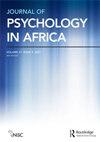视运动的时空期望与注意控制的效果
IF 0.8
4区 心理学
Q3 PSYCHOLOGY, MULTIDISCIPLINARY
引用次数: 0
摘要
摘要在考虑注意控制作用的基础上,研究了时间期望对运动物体视觉加工的影响。从两个行为实验中收集反应时间的数据作为结果测量。在实验1中,参与者(n = 36)被要求监视一个物体的运动,直到它消失,并在它再次出现时迅速做出反应。物体消失前的轨迹产生了对其随后重新出现的位置和/或时间的期望。结果显示,与没有期望相比,所有期望状态都显著缩短了反应时间。在实验2中,参与者(n = 34)在完成同样的反应时间任务的同时,还参与了一项工作记忆任务,该任务包括记忆一串字符。结果表明,只有时间期望和没有时间期望在反应时间上没有差异。综上所述,这些结果提供了证据,表明参与者可以根据有节奏的运动物体预测目标发生的位置和/或时间,而次要认知任务会损害时间预期。这些发现支持了关于移动物体需要注意控制资源的时间期望假说。本研究由广东省哲学社会科学项目(GD22YJY07)、广东省31所高校青年创新人才项目(2021WQNCX041)和岭南师范大学博士点专项基金(ZL1911)资助。本文章由计算机程序翻译,如有差异,请以英文原文为准。
Spatiotemporal expectations of apparent motion and the effect of attentional control
AbstractAn experimental investigation was conducted on whether and how temporal expectation influences visual processing in moving objects, while also considering the role of attention control. Data on reaction times were collected as outcome measures from two behavioural experiments. In experiment 1, participants (n = 36) were asked to monitor the movement of an object until its disappearance and respond quickly when it reappeared. The trajectory of an object before its disappearance generates expectations regarding the position and/or timing of its subsequent reappearance. Results revealed that all states of expectation significantly shortened reaction times compared with no expectation. In experiment 2, participants (n = 34) performed the same reaction time task while simultaneously engaging in a working memory task, which comprised memorising a string of characters. Results indicated that there is no difference in reaction times between the only temporal expectation and no expectation. Taken together, these results provide evidence to suggest that participants could predict the location and/or timing of target onset based on rhythmic moving objects, and that a secondary cognitive task impaired temporal expectation. These findings support the temporal expectation hypothesis regarding moving objects requiring attentional control resources.Keywords: attention controlrhythmic temporal expectationspatial expectationdual-task paradigmmotion Additional informationFundingThe research was funded by the Guangdong Philosophy and Social Science Project (GD22YJY07), and Youth Innovative Talents Project in 31 Colleges and Universities in Guangdong Province (2021WQNCX041), and the Special Fund for the Doctoral Program of Lingnan Normal University (ZL1911).
求助全文
通过发布文献求助,成功后即可免费获取论文全文。
去求助
来源期刊

Journal of Psychology in Africa
PSYCHOLOGY, MULTIDISCIPLINARY-
CiteScore
1.70
自引率
16.70%
发文量
62
期刊介绍:
Findings from psychological research in Africa and related regions needs a forum for better dissemination and utilisation in the context of development. Special emphasis is placed on the consideration of African, African-American, Asian, Caribbean, and Hispanic-Latino realities and problems. Contributions should attempt a synthesis of emic and etic methodologies and applications. The Journal of Psychology in Africa includes original articles, review articles, book reviews, commentaries, special issues, case analyses, reports and announcements.
 求助内容:
求助内容: 应助结果提醒方式:
应助结果提醒方式:


